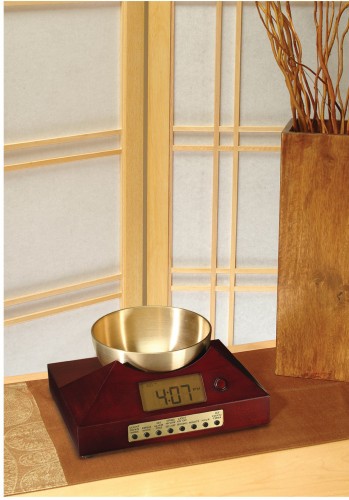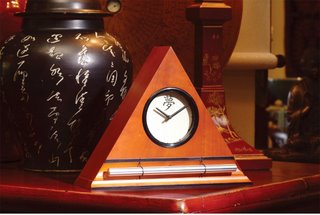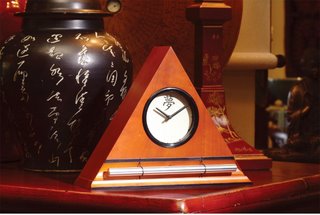|
 Secure Site
Secure Site
|
 |
Archive for the 'Natural Awakening' Category
 Utamaro Kitagawa, Bijin Combing Her Hair, 1750-1806 The key to create a wind-down period before bedtime is to create some space between your busy day and sleep time. “You can’t just work until 9 at night, and then stick your head on the pillow and fall asleep,” Khalsa says. So turn off the television, computer, and radio. Cut down on or eliminate evening classes and exercise that leaves you feeling amped up.
When you come home, honor this transition by playing relaxing music, lighting candles, or putting on your favorite pajamas and set your Zen Alarm Clock. Think of the yoga precept of pratyahara: Withdraw your senses in order to turn inward.
Our unique “Zen Clock” features a long-resonating acoustic chime that brings the meditation session to a gradual close, preserving the environment of stillness while also acting as an effective time signal.
adapted from yogajournal.com ‘Sweet Slumber’ by Nora Isaacs
 Zen Alarm Clock for a Gentle Awakening with a Bowl Gong
Now & Zen’s Chime Timer
1638 Pearl Street
Boulder, CO 80302
Posted in Bamboo Chime Clocks, Japanese Inspired Zen Clocks, Meditation Timers, Meditation Tools, mindfulness practice, Natural Awakening, Now & Zen Alarm Clocks, Progressive Awakening, Sleep Habits, Ukiyo-e, Well-being, Zen Timepiece by Now & Zen, Zen Timers
 Utamaro Kitagawa, A Mother Dozing While Her Child Topples a Fish Bowl A recent poll at the McGraw-Hill Companies posed this question to a few thousand employees: if there were more hours in the day, would you work, sleep, relax, socialize, or play? For the overwhelming majority, the answer was a no-brainer: sleep.
This is serious news: the Institute of Medicine of the National Academy of Sciences reports that sleep-related fatigue costs U.S. businesses $150 billion annually in absenteeism, accidents, and lost productivity. Charles Czeisler, M.D., a professor of sleep medicine at Harvard Medical School, has found that pulling an all-nighter or sleeping as little as four to five hours daily for a week produces the level of cognitive impairment experienced by a person who is legally drunk. Yet we glorify people who sacrifice sleep.
The U.S. is not the only sleep-deprived nation. As globalization takes its toll, cities in Spain are seeing the disappearance of the siesta due to long commutes that make a midday trip home impractical.
The problem even has Japan taking snoozing seriously. High school teachers in some areas are dimming the lights to give students a power nap. And in Bangkok, Thailand, last November, civil servants were encouraged to take naps at lunchtime in a room where cell phones are banned.
Sara Mednick, Ph.D., author of Take a Nap! Change Your Life, says that napping is also catching on in New York City, where MetroNaps, with its space-age-style sleep pods, offers respite at its location in the Empire State Building, and Yelo, a sleep salon on West 57th Street, provides hexagonal sleeping pods.
Meanwhile, the Medical Journal of Australia sang the praises of the 10-minute power nap, and the Australian organization SIESTA (Society for the Introduction of Extra Sleeping Time in the Afternoon) quotes specialists from the Adelaide Institute of Sleep Health on the mental and physical benefits of the nap. They join Harvard and Columbia studies suggesting that napping helps the brain process information and reduces accidents at work and on the road. Just tell that to the boss when you doze off! Be sure to set your Zen Alarm Clock to waken you gradually and gently so you can get back to work refreshed and altert.
 Chime Alarm Clock with Soothing Sounds Boulder, Colorado—an innovative company has taken one of life’s most unpleasant experiences (being startled awake by your alarm clock early Monday morning), and transformed it into something to actually look forward to. “The Zen Alarm Clock,” uses soothing acoustic chimes that awaken users gently and gradually, making waking up a real pleasure. Rather than an artificial recorded sound played through a speaker, the Zen Clock features an alloy chime bar similar to a wind chime. When the clock’s alarm is triggered, its chime produces a long-resonating, beautiful acoustic tone reminiscent of a temple gong. Then, as the ring tone gradually fades away, the clock remains silent until it automatically strikes again three minutes later. The frequency of the chime strikes gradually increase over ten-minutes, eventually striking every five seconds, so they are guaranteed to wake up even the heaviest sleeper.
adapted from Spirituality and Health Magazine, May 2007 by Swaha Devi
 Zen Chime Clock with Japanese Maple Leaves in Honey Finish Now & Zen’s Soothing Alarm Clock Store
1638 Pearl Street
Boulder, CO 80302
Posted in Bamboo Chime Clocks, Chime Alarm Clocks, Japanese Inspired Zen Clocks, Natural Awakening, Now & Zen Alarm Clocks, Progressive Awakening, Sleep Habits
Just Breathe
 meditation, just breathe Find a comfortable seated position and begin by observing your natural breath. Notice the texture, length, and rhythm as the breath flows in and out of your body. Feel the temperature of the air as it touches your nostrils. Take note, too, of pauses between breaths.
As thoughts arise, note them, but then allow them to float by like clouds, gently bringing your attention back to the breath. If you find it difficult to concentrate, try silently counting. For example, inhale 1, exhale 1, inhale 2, exhale 2, up to 10, and then repeat the cycle. After a while, you can stop counting and just focus on your natural breath.
Although meditation can be done in almost any context, practitioners usually employ a quiet, tranquil space, a meditation cushion or bench, and some kind of timing device to time the meditation session. Ideally, the more these accoutrements can be integrated the better. Thus, it is conducive to a satisfying meditation practice to have a timer or clock that is tranquil and beautiful. Using a kitchen timer or beeper watch is less than ideal. And it was with these considerations in mind that we designed our digital Zen Alarm Clock and practice timer. This unique “Zen Clock” features a long-resonating acoustic chime that brings the meditation session to a gradual close, preserving the environment of stillness while also acting as an effective time signal. The Digital Zen Clock can be programmed to chime at the end of the meditation session or periodically throughout the session as a kind of sonic yantra. The beauty and functionality of the Zen Clock/Timer makes it a meditation tool that can actually help you “make time” for meditation in your life.
adapted from Yoga Journal, ‘Presence of Mind’ by Janice Gates
 Zen Alarm Clock with Progressive Chime Now & Zen’s Mindfulness Timer Store
1638 Pearl Street
Boulder, CO 80302
Posted in Bamboo Chime Clocks, Chime Alarm Clocks, Japanese Inspired Zen Clocks, Meditation Timers, Meditation Tools, mindfulness practice, Natural Awakening, Now & Zen Alarm Clocks, Progressive Awakening, Yoga Timer, Yoga Timers by Now & Zen, Zen Timepiece by Now & Zen, Zen Timers
Create a simple and restful nighttime routine for you and your children
 Create calm and relaxing bedtime rituals Sat Bir Khalsa, a Kundalini Yoga teacher who’s also an assistant professor at Harvard Medical School and a neuroscientist at the Division of Sleep Medicine of Brigham and Women’s Hospital in Boston is studying how a form of Kundalini Yoga breathing called Shabad Kriya helps people with insomnia, offers good news: “Treating the arousal should treat the insomnia.” By creating a routine of soothing rituals, you can bring your nervous system back into balance and transform your sleep patterns for good.
Rituals for Relaxing
Whether it’s yoga to reduce muscle tension, breathing to slow the heart rate, or an herbal massage to calm a racing mind, a hot bath to sooth your tired body, or a bedtime story to slow you and your children’s minds, creating a simple routine can be the most effective way to get a better night’s sleep. Maintaining consistency will help you and your children keep your circadian rhythms—the biological changes that happen every 24 hours—steady. Eventually, your body will naturally understand and crave sleep during these hours. Set your Zen Alarm Clock as part of your bedtime routine.
By Nora Isaacs Yoga Journal
Wake up refreshed, love your alarm clock, transform your mornings with The Zen Alarm Clock’s progressive awakening with gentle chimes.
“The Zen Alarm Clock,” uses soothing acoustic chimes that awaken users gently and gradually, making waking up a real pleasure. Rather than an artificial recorded sound played through a speaker, the Zen Clock features an alloy chime bar similar to a wind chime. When the clock’s alarm is triggered, its chime produces a long-resonating, beautiful acoustic tone reminiscent of a temple gong. Then, as the ring tone gradually fades away, the clock remains silent until it automatically strikes again three minutes later. The frequency of the chime strikes gradually increase over ten-minutes, eventually striking every five seconds, so they are guaranteed to wake up even the heaviest sleeper. This gentle, ten-minute “progressive awakening” leaves users feeling less groggy, and even helps with dream recall.
 Zen Alarm Clock by Now & Zen Now & Zen – The Zen Alarm Clock Store
1638 Pearl Street
Boulder, CO 80302
Posted in Chime Alarm Clocks, Natural Awakening, Now & Zen Alarm Clocks, Progressive Awakening, Sleep Habits
 Basket of Organic Fruit Ukiyo-e The luxurious awakening provided by the Zen Alarm Clock is part of the growing preference for things natural—natural foods, natural fibers, and now, natural acoustic sounds. Like organic tomatoes in your salad, the organic sounds of the Zen Alarm Clock’s sweet acoustic chimes are truly a gourmet experience.
And those who like organic food may also appreciate how the Zen Clock can be used as an aesthetically sophisticated timer for practices such as yoga or meditation.
 Organic Sound of the Zen Alarm Clock's Chime is Acoustic Come by for a visit:
Now & Zen’s Natural Sounds Alarm Clock Store
1638 Pearl Street
Boulder, CO 80302
(800) 779-6383
Posted in Beauty, Chime Alarm Clocks, Japanese Inspired Zen Clocks, Natural Awakening, Now & Zen Alarm Clocks, Progressive Awakening
 Utamaro Kitagawa Ukiyo-e Print - Now & Zen, Inc., 1638 Pearl Street, Boulder, CO 80302 (800) 779-6383 Incessant mechanical bleating breaks your sweet sleep, and the morning is spoiled before it has even begun. Anyone who has relied on an alarm clock to get them out of bed can relate. Thank Buddha, for this jangling sunrise ritual can be transcended. Now & Zen offers a soothing alternative with the gentle Zen Alarm Clock.
This line of solid maple and walnut clocks uses chimes that emulate Tibetan bells to gently and gradually awaken users over a period of ten minutes. The chimes can also be used for meditation and yoga. To practice zen and the art of waking up, visit Now & Zen’s Headquarter Store in Boulder, Colorado.
Excerpt from Attache Magazine (October 2002) – US Airways by Kelly Cunningham
Now & Zen’s Chime Alarm Clock Store
1638 Pearl Street
Boulder, CO 80302
 Solid maple and walnut clocks use chimes to emulate Tibetan bells to wake you
Posted in Beauty, Japanese Inspired Zen Clocks, Meditation Timers, Meditation Tools, Natural Awakening, Now & Zen Alarm Clocks, Progressive Awakening, Well-being, Yoga Timer, Yoga Timers by Now & Zen, Zen Timers
 Koi Pond Ukiyo-e print Now & Zen introduced its original Zen Alarm Clock in 1996, but according to company founder and president, Steve McIntosh, the new bamboo Zen Alarm Clocks are the most beautiful of all their designs. “I’m really proud of the form, function, and sustainability profile of our new bamboo Zen Alarm Clock, it’s our greenest product yet,” said McIntosh.
The bamboo Zen Clock is available in four different dial face choices, with each dial silkscreened directly on bamboo veneer for an integrated, natural look. The new bamboo dial faces include one with contemporary numbers, one with simple modern lines, one with the Japanese character for “dream,” and a “bamboo leaf and stalk motif” inspired by Chinese ink painting.
The wood used in all Now & Zen products is sustainably grown on tree farms, and the company operates according to a strict policy of environmental sustainability for all its operations. However, the introduction of the company’s bamboo line sets a new standard for sustainability. Bamboo, which is a species of grass, is a very “green” material for making clock bodies. Compared to a hardwood forest the same size, bamboo produces 30% more oxygen and 20 times the biomass yield. Bamboo can be harvested annually after the first 5 to 7 years without replanting, compared to 25 to 50 years for trees, which then need to be replanted in bare soil. Moreover, Bamboo is the fastest growing woody plant on the planet, and it’s qualities of oxygen production, carbon sequestering, and water and soil retention make it one of the world’s most sustainable commodities as well.
 Bamboo canes growing in the wild
Now & Zen’s Bamboo Clock Store
1638 Pearl Street
Boulder, CO 80302
(800) 779-6383
 Bamboo Zen Clocks
Posted in Chime Alarm Clocks, Japanese Inspired Zen Clocks, Natural Awakening, Progressive Awakening
 Unique Brain Waves
Just in between the sleeping and waking state is a brain state known as the Alfa State. When in the Alfa State, your brain produces unique brain waves that have been found to be very helpful in increasing the effectiveness of personal affirmations.
An affirmation is a specialized technique of stating a goal to yourself in a way that re-programs your preconscious mind for improved performance. Affirmations are most effective when they are expressed as statements of fact or convictions written down in your own language. The most effective affirmations are personal, positive and in the present tense. For example, if your goal is to become a better parent, effective affirmations may include: “I am balanced in my expressions of discipline and understanding toward my children.” or “When I demonstrate love and compassion to my kids, they learn to show love and warmth to each other.”
 Affirmations and Zen Clocks by Now & Zen Inc To use a progressive alarm clock for an affirmation practice, formulate and write down an affirmation of improvement in your life. Before you go to sleep, read the affirmation to yourself and resolve to remember it when you first wake up. When you are first awakened by your Zen Alarm Clock, lie quietly in bed before moving or opening your eyes and repeat your affirmation to yourself three times. If you lie still, the chances are good that your brain will remain in the Alpha State during the first few strikes of the bowl or chime.
 Now & Zen Showroom, Boulder, CO If you do nothing to disturb this “freshly awakened” state while you repeat your affirmation to yourself, you will maximize the effectiveness of the affirmation through this alfa wave programming technique. Like the dreamwork techniques discussed above, the improvement of your life through affirmations in the alpha state can be accomplished without the use of Zen Clocks; but using the progressive alarm clock makes the process easier and more fun.
 Zen Clocks with Chimes Now & Zen Inc. – The Zen Alarm Clock Store
1638 Pearl St.
Boulder, CO 80302
Posted in Natural Awakening, Now & Zen Alarm Clocks
 wake up naturally I recently taught my students about chronobiology—the study of cycles in organisms. We talked about the importance of a good night’s sleep, which is greatly aided by allowing sunlight and moonlight to synchronize our internal cycles. This means gradually awakening to morning sunlight and allowing our bodies to relax before bedtime by avoiding bright light.
Taylor had been troubled by insomnia. After this class, she was ready for a change. A few hours before bedtime, she turned off bright lights around the house and wrapped up her computer use for the day (the light from a monitor can throw off your biological clock). An hour before bedtime, she lit candles and turned off all electric lights. By candlelight, she bathed, got into her night clothes and meditated before falling into a deep, peaceful sleep. In the morning, she was awakened by the gradually increasing sunlight and her chime alarm clock with progressively increasing natural acoustic sound by Now & Zen. She came to class glowing with refreshment and a new sense of empowerment. Now Taylor understands that her body needs a relationship with natural cycles of light and dark. “I’m not nearly as groggy as I used to be,” she says. “Light really is stimulating!”
adapted from Natural Home Magazine, September/October 2009 by Carol Venolia
If you don’t have the luxury to gently wake up to by light — try the next best alternative…waking gently to soothing chimes. Out Soothing Digital Chime Clock’s long-resonating Tibetan bell-like chime makes waking up a beautiful experience – its progressive chimes begin your day with grace.
Carol Venolia is an eco-architect and co-author of Natural Remodeling for the Not-So-Green House (Lark Books, 2006). She teaches in the Sustainable Communities program at Dominican University of California.
 Gentle Chime Clock to help you Naturally Wake-Up Now & Zen’s Natural Chime Alarm Clock Store
1638 Pearl Street
Boulder, CO 80302
(800) 779-6383
Posted in Chime Alarm Clocks, Natural Awakening, nature, Progressive Awakening, sleep, Sleep Habits, wake up alarm clock, Well-being
 The Dream-Health Connection Physicians in early Egypt and ancient Greece encouraged people to recall their dreams when seeking medical advice. Mexican and Native American shamans have long considered dream interpretation important for both healing and spiritual awareness. Tibetan medicine views dream work as a path to self-discovery, an awareness that can help create an inner balance — and inner balance contributes to good health.
The Dream-Health Connection
Indeed, the study of dreams in relation to health is gaining acceptance in the scientific community. One study reveals that the role of REM sleep and noting dream variables may be significant in helping patients gain quicker remission from marital separation-related depression (Psychiatry Research, 1998, vol. 80). Other research finds that dream content reflects waking life stressors in people with insomnia. Several studies tracked cancer patients’ dream series and reported that their dreams may have pointed to early cues for the presence of the disease process.
Katherine O’Connell, Ph.D., a clinical psychologist, dream analyst and founder of the Dream Institute in Santa Cruz, Calif., says that “listening to dreams can save your life.” She notes that dreams not only reveal symbols for health issues that need to be resolved, but they often reveal the herbal remedy for the problem — a method of medical dream work that dates back to ancient Egypt and Greece. For example, O’Connell finds that her clients often dream of flowers or herbs that are traditionally used to treat the ailments their physicians diagnose.
In her dream-work journey, O’Connell has studied dream medicine with Tibetan lamas and researched 3,500-year-old Egyptian homeopathic remedies used for dream recall. Through the process, she has also collected more than 5,000 dreams — her own and those of clients — for analysis.
O’Connell believes that viewing your dreams as a series is the best way to understand the complete picture of your physical and psychological health. She suggests writing your dreams down, then reviewing common threads that run through them. “I see dream work as a good mystery story with many chapters,” she says. “With each chapter, we gain more clues along the way.”
Cultivating Dream Awareness
To access the clues in your dreams, start with your knowledge of yourself. While dream symbol books can serve as loose guides, dream interpretation is really an individual matter. For example, the color green may represent money to your spouse but symbolize healing energy to you. Likewise, a spider can be your personal symbol of creativity whereas it may signal a venomous threat to someone else; similar dream images often have different interpretations for different people. So it’s important to tap into your own associations, feelings and intuition about your dream symbols. “We have such innate wisdom. We must remember to trust ourselves,” O’Connell says.
Want to be more in touch with your dreams? ASD offers the following tips:
- Remind yourself to remember your dreams before you fall asleep.
- Keep a pad of paper and pen or tape recorder by your bedside. As you awaken to your chiming Zen Alarm Clock , try to move as little as possible and try not to think right away about your upcoming day. Instead, immediately write down your dreams and dream images, as they can fade quickly if not recorded.
- Influence your dreams by giving yourself pre-sleep suggestions. Before going to bed, write down your agenda. Or say aloud what you want to know to strengthen the conscious-subconscious dream connection.
- Forgo taking alcohol or stimulants such as coffee or caffeinated tea before bed, as these substances interfere with REM sleep. Also, try taking a warm bath with a few drops of chamomile or cedar essential oil (first diluted in a carrier oil such as almond or walnut), or try practicing a few minutes of meditation to clear your mind for restful sleep and clearer dreams. Dreams not only have the potential to enhance your health but, as Jungian analyst Marie-Louise von Franz says, “Dreams show us how to find meaning in our lives, how to fulfill our own destiny and how to realize the greater potential of life within us.”
Sweet dreams.
adapted from Delicious Living, October 2000 by Deborahann Smith
 Zen Alarm Clocks with a progressive chime that doesn't interrupt your dreams Now & Zen – The Zen Alarm Clock Shop
1638 Pearl Street
Boulder, CO 80302
(800) 779-6383
Posted in Dreams, Japanese Inspired Zen Clocks, Natural Awakening, sleep, Sleep Habits, Zen Alarm Clock
« Previous Page — « Previous Entries
Next Entries » — Next Page »
|
|
|
|